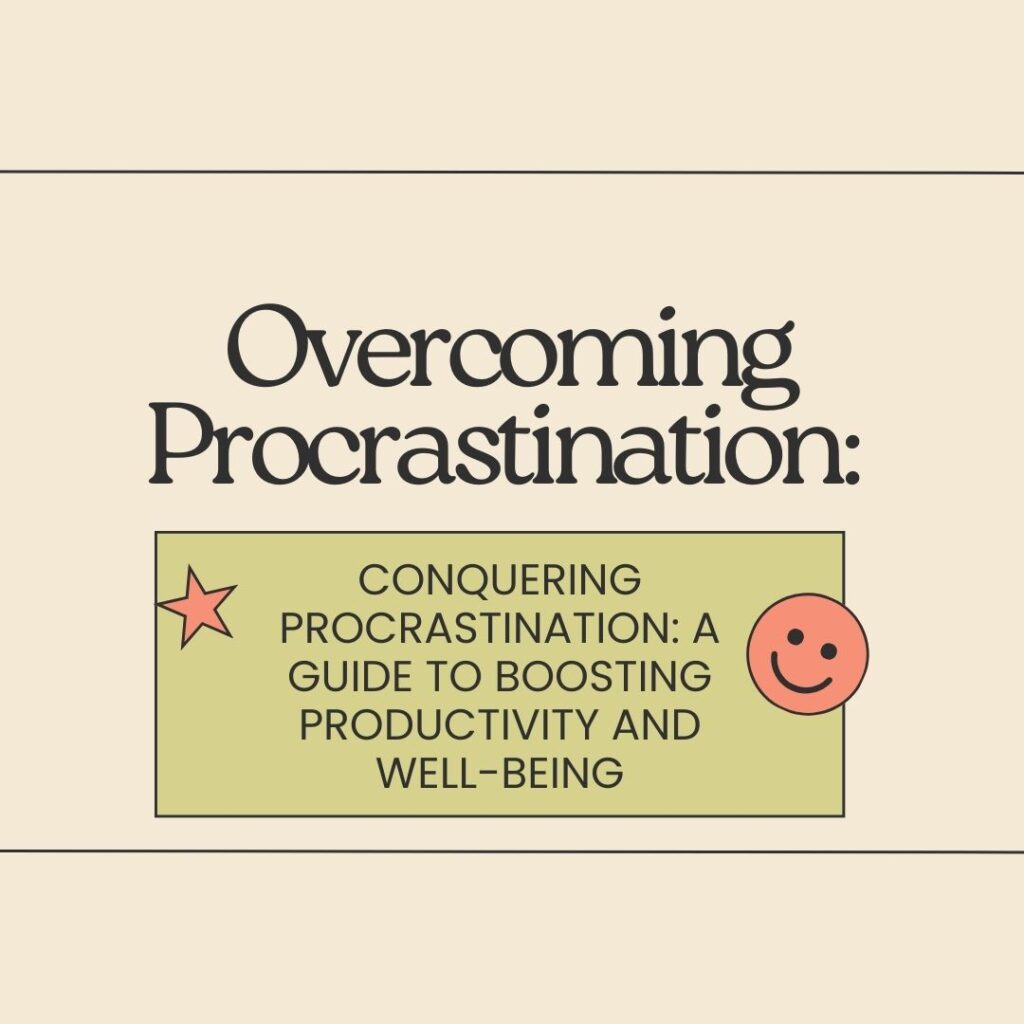Introduction: Procrastination—it’s a word that resonates with almost everyone. We’ve all been there, pushing tasks to the last minute, convinced that we work better under pressure. But what lies beneath this seemingly harmless habit? In this article, we’ll delve into the causes and effects of procrastination and explore practical strategies to overcome it.

Causes of procrastination:
Fear of Failure or Success: Procrastination often stems from the fear of not meeting expectations, be it our own or others’. The anxiety surrounding potential failure or even success can be paralyzing, preventing us from taking that first step.
Lack of Motivation: Without a clear sense of purpose or enthusiasm for a task, motivation wanes. We find ourselves putting off important projects because we lack the drive to see them through.
Perfectionism: The pursuit of perfection can be a double-edged sword. While aiming for excellence is admirable, the quest for flawlessness can lead to procrastination as we wait for the “perfect” conditions to begin.
Poor Time Management: In a world buzzing with distractions, managing time effectively is crucial. Poor time management can leave us overwhelmed, with tasks piling up and deadlines looming.
Effects on Mental Health:
Increased Stress and Anxiety: The constant pressure of impending deadlines and uncompleted tasks contributes significantly to heightened stress and anxiety levels.
Lower Self-esteem: Procrastination takes a toll on our self-worth. Unfinished projects can leave us questioning our abilities and competence.
Impact on Overall Well-being: Chronic procrastination can seep into various aspects of our lives, affecting our overall happiness and fulfillment.
Common Habits:
Social Media Distractions: The allure of social media often leads us down a rabbit hole of distraction, stealing precious time away from important tasks.
Task-switching: Constantly shifting between tasks may give the illusion of productivity, but it often hinders our ability to focus and complete tasks efficiently.
Waiting for the “Perfect” Moment: The misconception of waiting for the perfect conditions can be a significant roadblock. Spoiler alert: the perfect moment rarely arrives.
Set Specific, Achievable Goals: Break down larger tasks into smaller, more manageable goals. This not only makes the task less overwhelming but also provides a sense of accomplishment with each step.
Break Tasks into Smaller Steps: Divide tasks into actionable steps. This approach makes the overall process more digestible and allows for a steady progression.
Time Management Techniques: Experiment with time management techniques like the Pomodoro technique or time blocking to structure your work periods effectively.
Find and Eliminate Distractions: Identify and minimize distractions in your environment. Whether it’s turning off notifications or designating a distraction-free zone, creating a focused workspace is key.
Develop a Routine: Establishing a consistent routine provides structure and discipline. Knowing what to expect and when helps reduce the likelihood of procrastination.
The Role of Mindset:
Cultivate a Growth Mindset: Shift your mindset from fixed to growth-oriented. Embrace challenges as opportunities for learning and growth rather than insurmountable obstacles.
Embrace Imperfection: Accept that perfection is an unattainable ideal. Embracing imperfection allows for greater flexibility and a more forgiving approach to tasks.
Focus on Progress Rather Than Perfection: Celebrate progress, no matter how small. Recognize that the journey is as important as the destination.
Tools and Apps to Help:
Productivity Apps: Explore productivity apps like Trello, Todoist, or Asana to assist in task management and organization.
Tools for Blocking Distracting Websites: Consider using website blockers to limit access to distracting sites during work periods. These tools can help maintain focus and productivity.
Case Studies or Success Stories: Meet Sarah, a freelance writer who struggled with procrastination. By implementing the strategies discussed here, she not only met her deadlines but also experienced a significant boost in creativity and job satisfaction.
Conclusion: In the battle against procrastination, understanding its roots and adopting practical strategies can be transformative. As we actively work to overcome procrastination, we pave the way for increased productivity, improved mental health, and a more fulfilling life.
Call to Action: Share your experiences with procrastination and the strategies that have worked for you in the comments below. Let’s build a community of support and motivation!
Check out this article. Click Here
FAQs.
- Why do we procrastinate?
- Procrastination can stem from various factors, including fear of failure or success, lack of motivation, perfectionism, and poor time management.
- Is procrastination always a bad thing?
- While occasional procrastination is common, chronic procrastination can have negative effects on productivity and well-being. Learning to manage and overcome procrastination is key.
- How can I overcome the fear of failure that leads to procrastination?
- Overcoming the fear of failure involves reframing your mindset, setting realistic goals, and focusing on the learning opportunities that come with challenges.
- What role does mindset play in overcoming procrastination?
- Mindset plays a crucial role. Cultivating a growth mindset, embracing imperfection, and focusing on progress rather than perfection can significantly impact your ability to overcome procrastination.
- Are there specific tools or apps that can help with procrastination?
- Yes, there are several productivity apps like Trello, Todoist, and Asana that can assist in task management. Additionally, website blockers can help limit access to distracting sites during work periods.
- How do I deal with procrastination caused by social media distractions?
- To tackle social media distractions, consider setting specific times for social media use, using website blockers, and creating a dedicated, distraction-free workspace.
- Is multitasking a good strategy to combat procrastination?
- No, constant task-switching can hinder productivity. Instead, focus on one task at a time and use techniques like time blocking to manage your workload more effectively.
- Can procrastination be a sign of a larger issue, such as mental health concerns?
- Chronic procrastination can be linked to mental health issues such as anxiety and depression. If procrastination significantly impacts your daily life, it may be beneficial to seek support from a mental health professional.
- How do I find the motivation to tackle tasks I don’t enjoy?
- Break down larger tasks into smaller, more manageable steps, and try to find intrinsic motivation by connecting the task to your overall goals or values.
- What are some quick tips for overcoming procrastination right now?
- Start with a small, manageable task to build momentum. Set a specific timeframe for focused work (try the Pomodoro technique), and eliminate distractions by creating a dedicated workspace.








